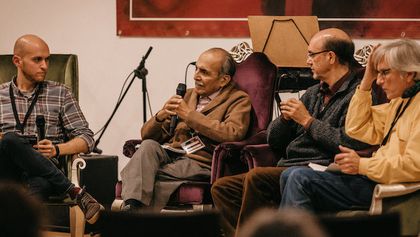Peruvian theologian Samuel Escobar analyses the decade from a missionary perspective: the changes in Christianity, the role of migration in evangelism, and the work for justice.
 Photo: Nina Streh. Unsplash (CC0).
Photo: Nina Streh. Unsplash (CC0).
In our series of in-depth interviews to review the main issues that have marked the decade, it is the turn to analyse the field of mission.
To address this issue, we spoke to Samuel Escobar, a reference in Latin American Protestantism.
Currently based in Valencia (Spain), Escobar is a theologian, writer and international speaker, who has actively participated in the three world congresses of the Lausanne Movement, the last one held at the end of the last decade (2010). He has also been a key figure in the IFES students movement.
According to Escobar, the presence of the evangelical church in society; the way in which the big social, religious and economic changes have affected the mission, and the growth of migration and its role in evangelism; have been some of the key issues related to mission in the last 10 years.
Question. It may be necessary start by saying that we are talking about mission, not just "missions". Could you briefly explain what we mean when we talk about mission?
Answer. In recent times, we have realised that the use of the word "mission" has been somewhat restricted. "Mission" has been used when people are sent to another country to plant churches or announce the gospel where it is not known.
But mission can only be understood well if we understand that the church must always be on mission. Its presence in a place, its way of living and giving testimony, as well as the proclamation, the preaching that the church offers... All that is part of its mission.
We are recovering a broader vision of what “mission” means, without losing the emphasis on the evangelization, which is very important.
Q. We see that evangelical Christianity has grown worldwide during this decade, especially in Africa, Asia and Latin America. What impact is this having on the world?
A. It is as if we had not noticed it. We still think of England or North America as the places were the missionary force comes from. But things have changed a lot. Today, for example, Korea sends missionaries around the world, with tremendous enthusiasm and discipline. Brazil also sends many.
We live in a time in which the church has grown in territories that were once mission targets. Taking note of this is important.
European countries that we used to describe as Christian have been de-Christianising. There is a strong influence of agnosticism, secularism, and institutionalised religion.
Migrants who come to Europe are the ones who often bring the enthusiasm of sharing the gospel, founding churches, using the media to share the message.
Q. One of the important events, at a mission level, was the celebration of the Lausanne Movement Congress, held in Cape Town in 2010. In a way, that congress inaugurated a decade. What assessment would you make of the impact of the Lausanne movement?
A. Lausanne 2010 is interesting to me, because for me, Lausanne was the year 74.
It was a big moment in world Protestantism, because there was a confluence of evangelical movements interested in evangelisation, and the appearance of churches that were growing in Africa or America, which wanted to respond to the social situations they lived in.
From the confluence of both concerns arises the Lausanne Agreement. Fifteen years later, another congress was held in Manila, as a continuity. The one in South Africa in 2010 is the third stage.
I think it has contributed to keep the interest in evangelisation alive. The church exists to be a testimony of God's work, but the quality of its presence, the dimension of church service is also important. We saw all this in South Africa.
Today we no longer discuss whether we should evangelise or do social work. When the challenge of social work appears, it is done, and others are evangelised through it.
Q. One of the ideas of the Lausanne Congress is that there are no social aspects that are alien to the gospel. Do you think we are aware today that mission is something that involves all Christians in their day to day life?
A. The challenges are changing, and the church must be attentive to answer the questions that people have. We are in danger of answering in our preaching questions that nobody asks. The church must read the signs of the times.
People like the Spanish pastor and journalist José de Segovia, who analyses what people see in the cinema and how it influences them, are a good example. It is important for us to know how to apply the Biblical text to any area.
Another interesting example is IFES, which a few years ago made a special edition of the Ecclesiastes to us in evangelism.
When I worked in the GBU (IFES in Spain) for 26 years, it would never have occurred to me that Ecclesiastes is a book to evangelise. But it turns out that it was, because it is a discourse that can be compared with today's society and today's intellectuals messages. Ecclesiastes talks to people who have questions about the absurd and the desire we have to understand beyond the rational.
Q. Do you think the church should be aware that we are no longer in a society that comes out of Roman Catholicism, but with people who no longer know anything about God or the church?
A. Our society is already post-Costantinian. In the Constantinian society, political power was linked to religious power, so that the religious institution could restrict people, force them. That has changed.
Today, the power of the established church is rejected. It is true that, in places like Spain, for example, the Catholic church still has some power, but there are already many Catholics who do not depend on it for their lives, and many of them have similar experiences to evangelicals, for example in the Bieble study materials they use.
Evangelicals are no longer a poor persecuted minority. They have religious freedom and can use resources for the public announcement of the gospel.
I have been invited several times to speak on a television program that a Colombian church has. They come from a country where it is normal to use the media. Now that it is possible to use it, we have to find creative ways to communicate. We had a pastor in the Spanish city of Alcoy, Adolfo de Silva, who wrote an article in the local newspaper every week, and they published it. Times have changed.
Music is another very useful tool. During the celebration of the 500th anniversay of the Reformation in Valencia, a high quality choir was formed, which managed to sing in the cathedral. The Catholic authorities accepted it, and it was a way of bearing witness.
There are people who come to us because they like music. They would not listen to a sermon, but they would if it is a sung sermon. They even ask if they could participate in the choir. This is an approach with tremendous possibilities, and, by the grace of the Lord, we evangelicals have many who are good in singing.
 Samuel Escobar at the Spanish National Meeting of Graduates Bible Groups (GBG). / GBG.
Samuel Escobar at the Spanish National Meeting of Graduates Bible Groups (GBG). / GBG.Q. What are your expectations for the coming years?
A. I believe that as evangelicals, an important part of our vocation is to stay rooted in the Word of God. Our message, our way of understanding life, and even the pastoral we will need to develop, comes from it.
We have trends that seem dangerous to me. One is to support whatever we think is good. For example, the Do not Mess with My Children platform, which is a movement that began in Peru, among the conservative Catholic groups that fight against abortion, and evangelicals without much idea of Protestant ethics, joined this movement.
In my opinion, this way of seeing things betrays our Biblical vocation. We have a Protestant ethic that is different from Catholic ethics, for example in sexual issues, or regarding the family. We do not think celibacy is better than being married. We have to be sure that our ethics comes from the Bible, not buying the cause of others, just because it resembles ours. That is a great challenge - what will be the quality of our presence?
Our attitude towards Catholicism should also be reviewed. We must recognize that Catholicism has changed. There are sectors within Catholicism that have the same concern as we do about the Bible.
Many of the books I use in Bible study are from Catholic publishers, and they are useful tools.
We must review certain things, to see how much we can accept from this socio-political agenda, and how much of our own way of being in society we can build, without feeling as victims, or imitators of Catholicism.
Q. Anything else you would like to add?
A. Yes. Spanish news website Protestante Digital, has given the Unamuno friend of the Protestants Prize to University teacher and writer, José Luis Villacañas, who has been part of the public debate that is taking place in Spain, on whether the country will again be seen as the model of Christianity.
We have to know how to understand this phenomenon and how to conduct ourselves in the face ot this.
José Luis Villacañas has responded to a book by Spanish writer Elvira Roca, which is a defense of old Spain, of a blind Catholic conservatism, and it has an incredible amount of slander about Protestants.
We have given him the Unamuno prize because he does understand this historical relationship and the need to clarify things in the midst of this confusing debate.

Las opiniones vertidas por nuestros colaboradores se realizan a nivel personal, pudiendo coincidir o no con la postura de la dirección de Protestante Digital.
Si quieres comentar o